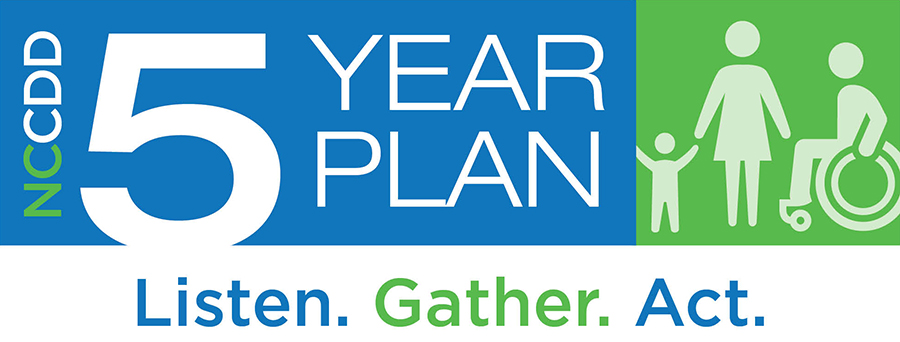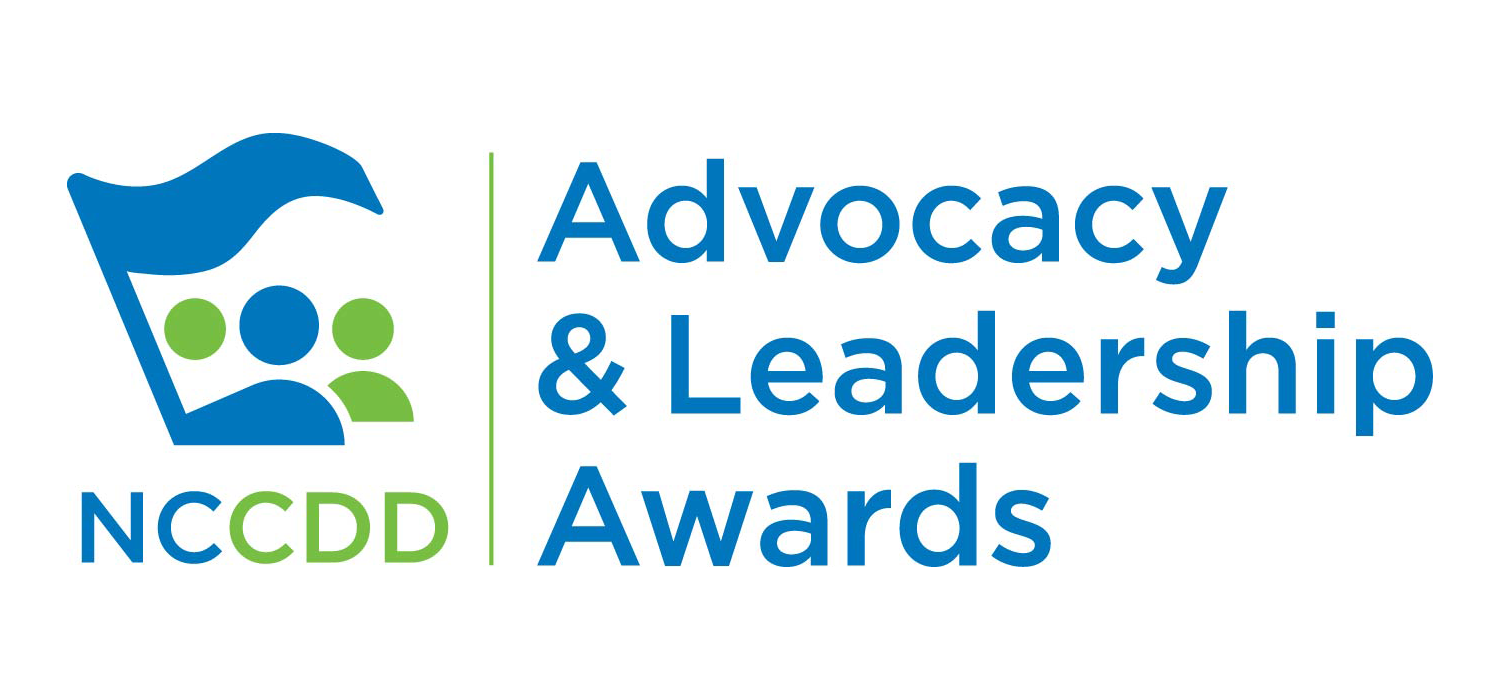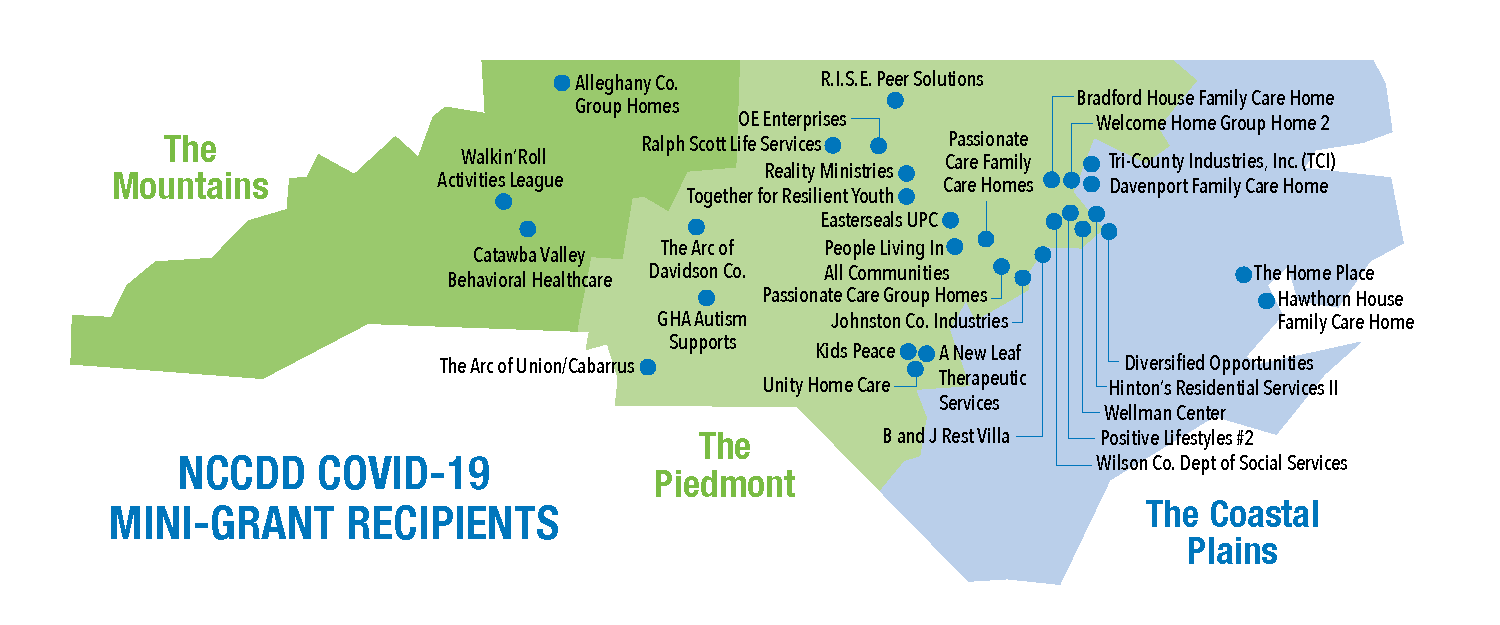June 2020 - Highlights and Hot Topics

Letter from the Executive Director
This is a wrenching, but critical time. This is a time in which we must reflect and a time in which we must act.
All of us have been shaken by the killing of George Floyd in Minneapolis. Many have taken to the streets across the United States, the world and here in North Carolina. Throughout our country, there are difficult, important conversations about race, law enforcement and justice happening in our communities.
Our staff at the North Carolina Council on Developmental Disabilities meets each morning on Webex for a staff meeting at 8:30 a.m. On the Thursday after George Floyd’s death, we created space and time for our team to talk about what we were experiencing. Powerful words were spoken.
We worked together on a statement for the Council. We had difficult conversations about what we could say or should say. We struggled with how we can act and grow and how we can confront the racism that pervades our communities. We wanted to make sure that what we wrote was authentic and that we would follow through on what we said.
I am grateful for a team that took this process seriously. I am grateful for a team that understands the gravity of the moment we are in and that change is needed.
Before Minneapolis, our team had been discussing how we can take authentic, concrete steps to be more diverse and inclusive. These conversations took greater form and immediacy with all that has occurred this month.
We will work this summer to do a self-audit, to look at our work, our initiatives, our recruitment and our budget. We will examine the systems for people with intellectual and other developmental disabilities. We will educate ourselves on the diversity within North Carolina. We will bring in an outside facilitator to help us have real honest conversations of how we can be authentically more diverse and inclusive. We will commit to specific steps forward.
We know our steps forward will be imperfect, but, in this critical time, we must act to end racism and include all of every race and ability.
Talley Wells, Executive Director
Public Policy Update as of June 15

FEDERAL
Legislative
In Congress, the House passed the HEROES Act, which is the fourth COVID-19 bill. The HEROES Act is a massive $3 trillion proposal, even more ambitious than the $2.2-trillion CARES Act. This relief legislation promises a second stimulus check, debt relief, student loan forgiveness, hazard pay, six more months of COVID-19 unemployment, housing and food assistance, and nearly $1 trillion in aid for state and local governments so they can pay “vital workers like first responders, health workers, and teachers” who are at risk of losing their jobs due to budget shortfalls.
The Senate is not eager to take up this new coronavirus legislation, arguing that Congress needs to assess the impact of other stimulus bills on the country. Leadership has stated that they do not expect to pass another round of relief legislation until later in July.
Areas we would like to see directly addressed in the next legislation include:
- Funding for home and community based services
- Identification of direct support professionals as essential workers so they would be eligible for any increased wages or benefits in the next legislation
- Access to Personal Protective Equipment for direct support professionals
- Ensure that any incentive payments include all people with disabilities, including those who are claimed as dependents.
Policy
The U.S Department of Health and Human Services’ Office (HHS) for Civil Rights said Tuesday it reached a resolution with the state of Connecticut in a first-of-its-kind complaint filed by disability advocates. The complaint alleged that the state’s policies related to hospital visitors during the COVID-19 pandemic violated the Americans with Disabilities Act, Section 504 of the Rehabilitation Act and the Affordable Care Act. As part of the resolution with the HHS Office for Civil Rights, Connecticut is issuing an executive order creating a new statewide policy requiring that people with disabilities be allowed to have a designated support person with them at the hospital. Disability advocates said that while the resolution is specific to Connecticut, its significance extends beyond the state. Hopefully this can serve as a model for other states.
As part of the federal coronavirus relief bills earlier in the year, a $175 billion the Public Health and Social Services Emergency Fund was established. There have been delays in releasing these dollars for the benefit of Medicaid beneficiaries. The Administration announced recently that it is sending billions of dollars in aid to disability providers and others funded by Medicaid who have been impacted by the pandemic. The U.S. Department of Health and Human Services said this week that some $15 billion will go toward providers serving individuals covered by Medicaid and the Children’s Health Insurance Program, including home- and community-based services providers.
Federal Bills to Follow
SNAP Online Purchasing Flexibility Act of 2020, H.R. 6510 - This bill directs the Department of Agriculture to authorize all states to participate in the Supplemental Nutrition Assistance Program (SNAP, formerly known as the food stamp program) online purchasing program during the COVID-19 (i.e., Coronavirus disease 2019) public health emergency. The program allows approved retail food stores to accept SNAP benefits through online transactions.
Food Assistance for Kids and Families During COVID-19 Act of 2020, S. 3563 - This bill would provide authorization and funding for grocery delivery services via SNAP.
Both of the above bills would allow people with disabilities to utilize their SNAP benefits while protecting themselves and their families in this time of crisis.
Strengthening UI for Coronavirus Impacted Workers and Students Act, H.R.6680 - This bill would make several improvements to unemployment insurance (UI) benefits, including exempting them from income for all means-tested programs. This would allow people with disabilities to receive UI benefits without complicating eligibility for Supplemental Security Income (SSI) or the Supplemental Nutrition Insurance Program (SNAP).
STATE
Legislative
Since May 18, the North Carolina General Assembly has been in short session, has introduced multiple bills, and continues to examine COVID issues, budget issues, and other needs. A comprehensive budget is unlikely this session. Instead, a series of ‘mini-budgets’ to address critical budget needs has been introduced. Below you will find legislation and bills related to intellectual or other developmental disabilities (I/DD).
Legislation Passed:
H1169 – Bipartisan Election Act of 2020 – addresses the ability to vote by absentee ballot. By requiring only one witness signature and allowing for an online ballot request process, it is intended to make voting easier as we head into election season in the midst of the COVID-19 pandemic.
S476 – School Based Mental Health - Requires the state board of education to adopt a school-based mental health policy and to require K-12 school units to adopt and to implement a school-based mental health plan that includes a mental health training program and a suicide risk referral protocol.
Bills still following:
H488 – Address Direct Support Personnel Staffing Crisis – this bill funds the salary increases for International Classification of Functioning (ICF) Direct Support Professionals (DSPs) to match the salaries of DSPs in state facilities. It also includes funds to conduct a study of rates paid to DSPs providing innovations services. (This bill was filed in late March and seems to have stalled at this point, but hopefully it might be included in one of the mini-budgets.)
H1149 - Police Notice of Person with I/DD in Vehicle – directs the Division of Motor Vehicles to develop a designation for drivers’ licenses that may be granted upon request to a person with I/DD. There is significant opposition to this bill and concern about having this information stored within the DMV database with potential for discrimination in renewal of licenses.
H1181 - Certain Appropriations For Education/COVID – allocates funds to educational entities to address issues related to COVID-19. It includes $25 million to the Department of Public Instruction for grants to public schools to address COVID related costs for students with disabilities.
H1196 - Funds/COVID-19 Tests & Personal Protective Equipment (PPE) for Congregate Living allocates $12 million from the Coronavirus Relief Funds to conduct testing for staff in congregate living settings and distribute Personal Protective Equipment to congregate living settings.
H1173 – Disapprove Certain DHHS Rules – this bill proposes to disapprove a list of rules that have already been approved by the Rules Review Commission. One of the rules is related to screening and care for people with I/DD in jail settings, which was a set of rules that had been vetted and approved by several I/DD entities and seen as a positive step in addressing issues in jails. There continues to be opposition to this bill in the I/DD community. This bill has been pulled but it may come up again.
S730 – No Patient Left Alone Act – addresses the visitation rights of hospital patients to have someone present while receiving hospital care.
S808 – Medicaid Funding Act – includes appropriations for several purposes including funds for moving Department of Health and Human Services (DHHS) offices from the Dix Campus, COVID relief funds for behavioral health and crisis services, funds for Medicaid, and Medicaid Transformation reserve funds. This bill also makes changes to the methods related to medicaid savings in LME/MCOs. It also delays implementation of the Standard Plan to July 2021.
S834 – Close the Medicaid Coverage Gap – proposes another approach for filling the health insurance coverage gap (sometimes referred to as Medicaid expansion). This bill only covers single adults up to 133% of poverty, instead of all those in the gap, but does so without the work requirements.
You can review the status of each bill by searching the bill numbers at https://www.ncleg.gov/BillLookUp/
Policy
The Department of Health and Human Services continues to address COVID-19 through use of waivers described in the May Highlight and Hot Topics. Recently, additions to Appendix K, which allowed flexibility for the Innovations and Traumatic Brain Injury waiver, were approved by CMS. Some of the additional flexibilities include: relatives and legally responsible persons may provide services for more than one 90 day period, primary Alternative Family Living (AFL) providers may provide Supported Employment, Day Supports, and Community Networking, the requirement for Letter of Medical Necessity/prescription for Assistive Technology is temporarily waived.
Below are links to resources for COVID-19:
- NC Council on Developmental Disabilities COVID-19 resource page
- NC COVID-19 page
- CDC COVID-19 page
- Hope4NC Hotline for mental health resources 24/7: 1-855-587-3463
- Hope4Healers Helpline for care professionals 24/7: 919-226-2002
Council’s Five-Year State Plan Needs Your Input
 NCCDD is seeking input to develop its new Five-Year State Plan - 2022-2026 and wants to hear from individuals with disabilities, family members, community members, caregivers and other stakeholders regarding what should be included in the Plan’s goals, objectives, and specific activities.
NCCDD is seeking input to develop its new Five-Year State Plan - 2022-2026 and wants to hear from individuals with disabilities, family members, community members, caregivers and other stakeholders regarding what should be included in the Plan’s goals, objectives, and specific activities.
The survey has been created by the Council to guide individuals with I/DD in providing their thoughts on the upcoming Five-Year Plan.
The survey is available in both English and Spanish on the NCCDD website here. There are surveys with different questions for family members and community members to provide their thoughts and ideas, also. Deadline to submit surveys is Friday, July 31, 2020.
The Council's State Plan, developed in accordance with the Developmental Disabilities Assistance and Bill of Rights Act of 2000 (DD Act), guides the Council regarding how staff and fiscal resources are allocated.
Nominations Open for NCCDD’S 2020 Advocacy and Leadership Awards
 Nominations for the 2020 North Carolina Council on Developmental Disabilities’ (NCCDD) Advocacy and Leadership Awards are now open! The Council seeks nominations from across the state of North Carolina. The awards are:
Nominations for the 2020 North Carolina Council on Developmental Disabilities’ (NCCDD) Advocacy and Leadership Awards are now open! The Council seeks nominations from across the state of North Carolina. The awards are:
- The North Carolina Leadership Achievement Award recognizes an outstanding North Carolina self-advocate whose work has improved the quality of life for people with intellectual or other developmental disabilities (I/DD).
- The Jack B. Hefner Memorial Award honors family members or volunteers who are advocating and building a better North Carolina for people with I/DD.
- The Helen C. "Holly" Riddle Distinguished Service Award recognizes professionals who have made lasting contributions towards improving opportunities, breaking down barriers and promoting increased quality of life for people with I/DD in North Carolina.
The nomination process is now open, and anyone can nominate or apply for an award here through July 31, 2020. The recipients will be announced on November 4, 2020 at the NCCDD Quarterly Meeting Cary, NC.
Council Awards 37 Mini Grants To Support Programs and Services During COVID-19
 Thirty-seven mini grants were awarded by NCCDD from its relief fund to agencies and organizations serving people with intellectual or other developmental disabilities (I/DD) throughout North Carolina to help with needed services and supplies while many agencies and nonprofits deal with the coronavirus.
Thirty-seven mini grants were awarded by NCCDD from its relief fund to agencies and organizations serving people with intellectual or other developmental disabilities (I/DD) throughout North Carolina to help with needed services and supplies while many agencies and nonprofits deal with the coronavirus.
The impact reached statewide. The 22 adults with I/DD living in group homes overseen by The Arc of Davidson County in Lexington, NC, have been unable to have in-person visits with their loved ones since the shelter in place order was established on March 16.
With the financial help of the Council’s mini-grant, The Arc purchased screens which allow for voice and video calls with family and the ability to interact through Echo Show with friends living in other group homes. In addition, they purchased arts and crafts as well as indoor and outdoor sports games that are helping to keep everyone entertained.
Walkin’Roll Activities League in Claremont, NC, used their mini grant funds to purchase t-ball t-shirts for over 150 individuals with developmental disabilities (ages two to 80), coaches and volunteers for their annual t-ball league games postponed due to the COVID-19 virus. During normal times, t-ball games occur every Saturday in the summer for eight to 10 weeks with over 100 participants.
With their mini-grant, Wilson County Department of Social Services plans to provide 10 clients with I/DD and their families with supplies including weighted blankets, hygiene items, movies, puzzles, activity books and food.
You can read about other mini grant recipients on NCCDD’s website here.
Audio - Highlights and Hot Topics

